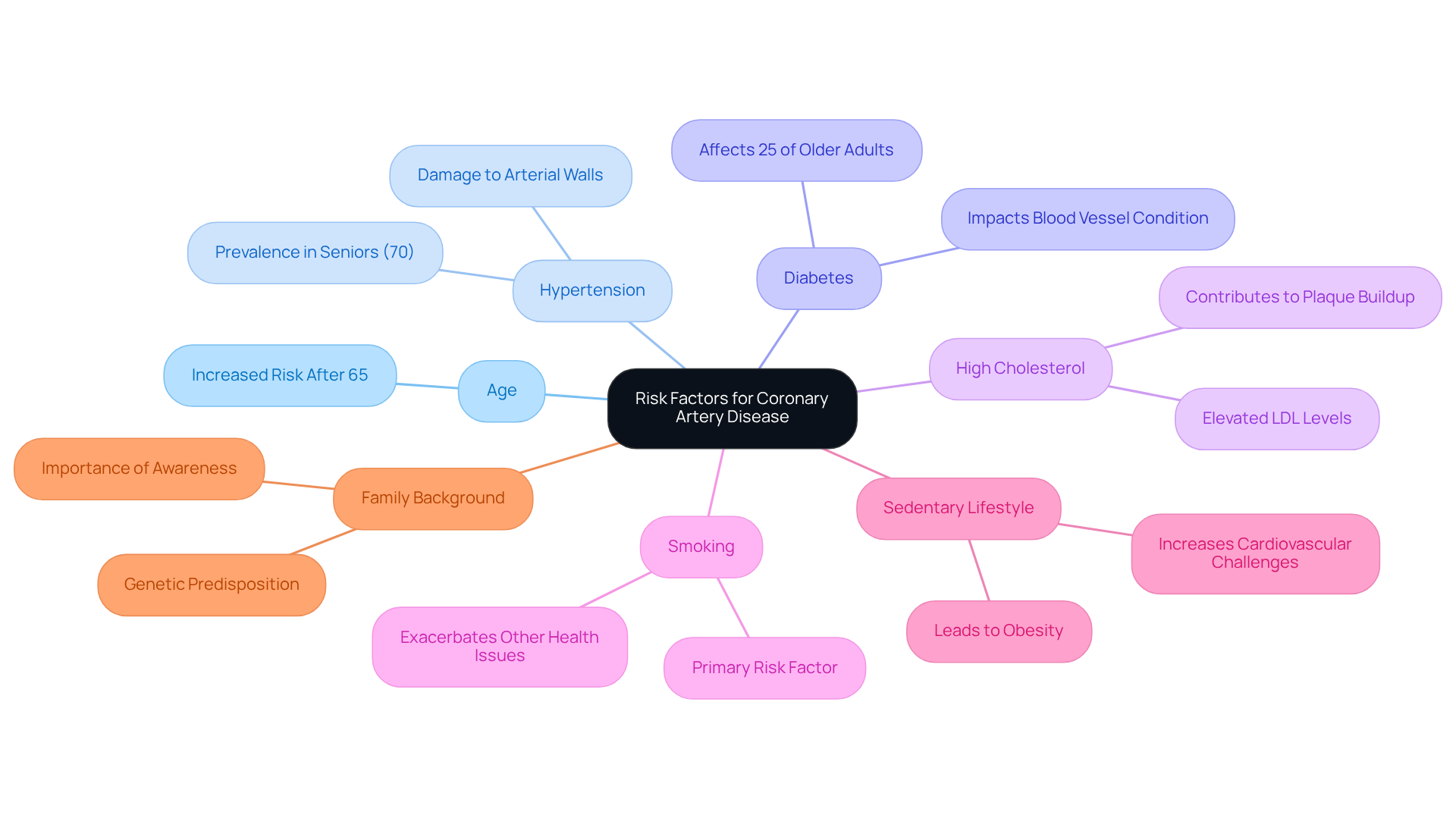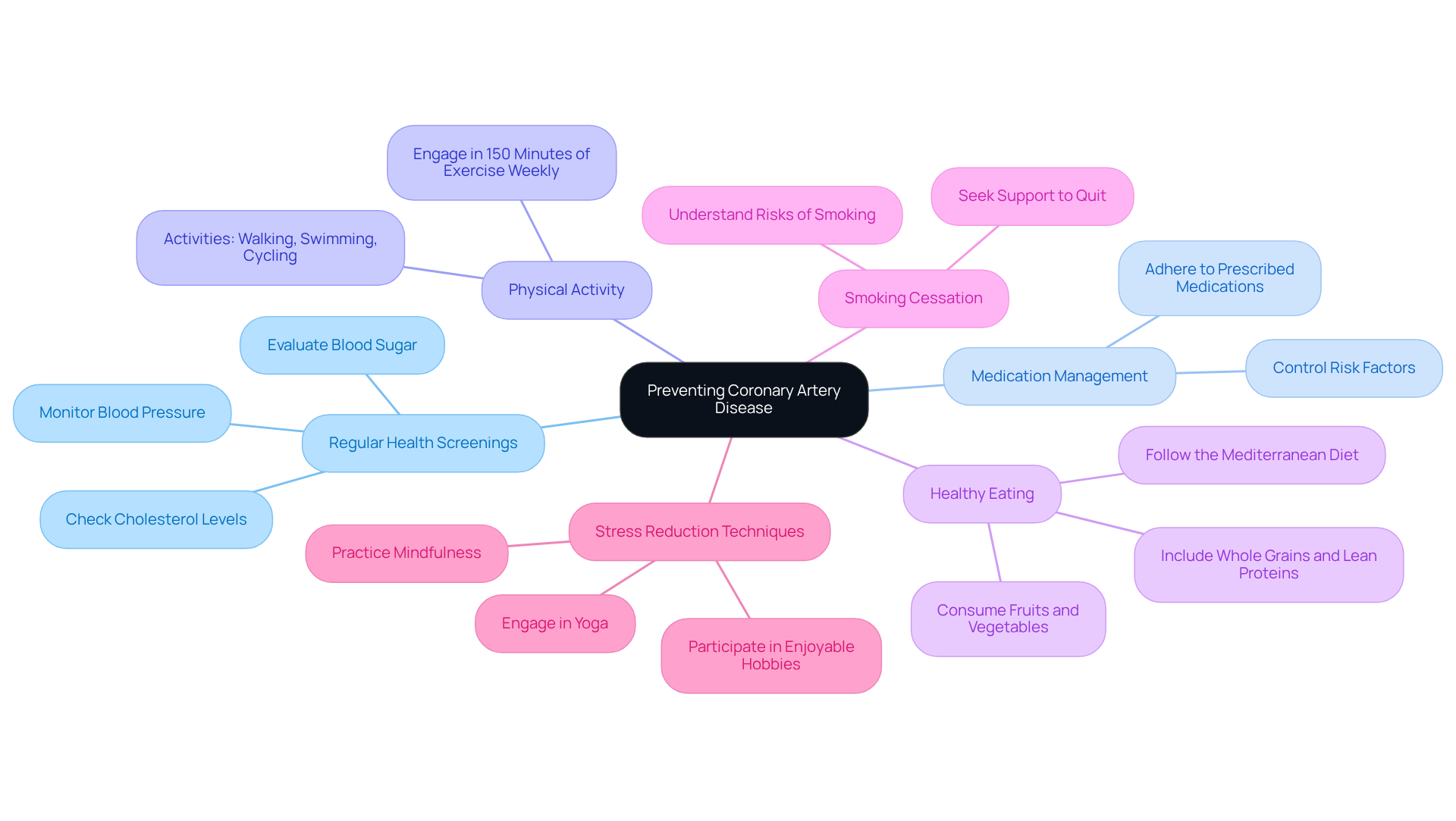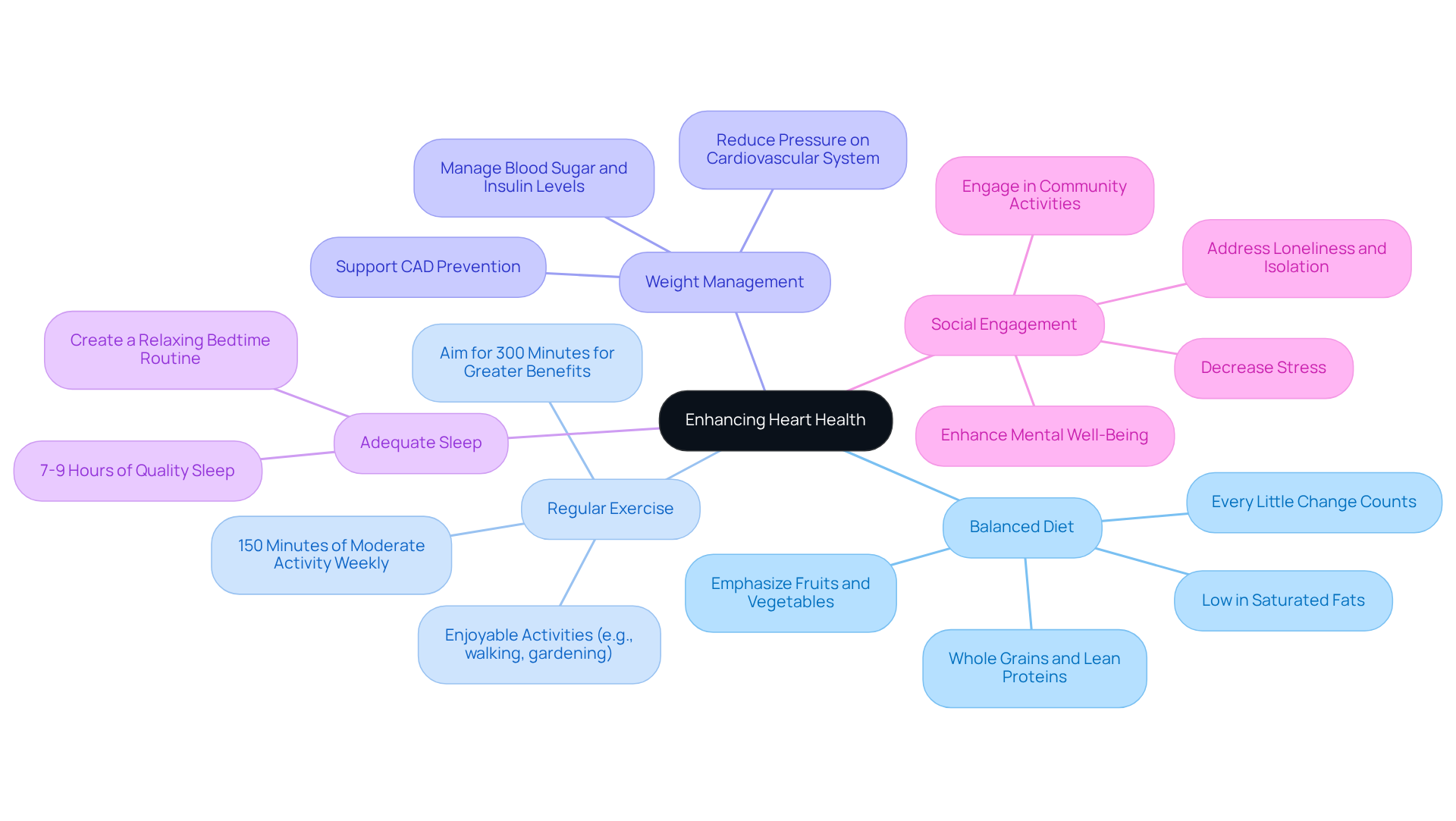


Effective strategies for preventing coronary artery disease (CAD) in seniors are vital for maintaining health and well-being. Regular health screenings, medication management, a heart-healthy diet, and engaging in physical activity are essential components of this approach. These strategies, supported by evidence and expert recommendations, can significantly lower the risk of CAD and enhance overall cardiovascular health among older adults.
In addition to this, it’s important to understand that making these changes can feel overwhelming. Many seniors may have concerns about their health and the steps they need to take. However, by embracing these strategies, you are not only taking proactive steps for your heart but also improving your quality of life.
Furthermore, consider reaching out to healthcare professionals who can guide you through this journey. They can provide personalized advice and support that fits your unique situation. Remember, you are not alone in this; there are resources and people who care and want to help you succeed in your health goals.
Ultimately, adopting a heart-healthy lifestyle is a journey filled with small, manageable steps. By prioritizing your heart health, you are investing in your future well-being. Embrace these strategies with confidence, knowing that every positive change is a step toward a healthier, happier life.
Understanding coronary artery disease (CAD) is crucial, especially for seniors, as it significantly impacts heart health and overall well-being. With nearly 1 in 20 adults affected by this condition, recognizing the risk factors and symptoms is vital for timely intervention. This article explores effective strategies for CAD prevention, highlighting lifestyle changes, diet, and exercise that can empower older adults to take control of their heart health. But with so many options available, how can seniors navigate the best practices to ensure a healthier future?
In addition to this, it’s important to remember that you are not alone in this journey. Many seniors share similar concerns about their heart health, and there are supportive resources available to help you. As we delve into these strategies, we encourage you to reflect on your own health and consider the positive changes you can make. Together, we can work towards a healthier future.
Coronary artery disease (CAD) is a serious condition that can deeply affect your heart health. It occurs when the coronary arteries become narrowed or blocked due to a buildup of atherosclerotic plaque. This obstruction can limit blood flow to the heart muscle, potentially leading to chest pain (angina), heart attacks, and other serious cardiovascular issues. As we age, the prevalence of CAD increases, making it crucial for seniors to understand this condition and its implications.
Did you know that approximately 1 in 20 adults aged 20 and older are impacted by coronary artery disease, often without any prior symptoms? Recognizing the signs—such as chest pain, shortness of breath, and extreme fatigue during activities—is vital for timely intervention. Common risk factors include:
These can significantly increase the likelihood of developing CAD. Interestingly, men typically face a higher risk compared to women, with the likelihood for women increasing after menopause.
At Amavita Heart and Vascular Health®, we are dedicated to providing comprehensive cardiac evaluations and personalized care focused on CAD prevention to address these concerns effectively. Our preventive cardiology strategy incorporates advanced assessment tools and customized interventions, including lifestyle changes and CAD prevention procedures for individuals at high risk. This approach significantly lowers the chance of a cardiac event.
We understand that timely diagnosis is essential. That’s why we offer advanced imaging and testing all in one location, ensuring precise diagnosis without delay. Our minimally invasive treatments allow for same-day recovery, enabling patients to return home just hours after their procedures.
By adopting effective CAD prevention strategies, such as maintaining a nutritious diet, engaging in regular exercise, and avoiding smoking, older adults can significantly reduce their risk of CAD. Furthermore, our cutting-edge AI-driven CardioElite™ program enhances early detection through advanced diagnostic technology. This ensures you can make timely and informed choices about your cardiovascular health.
Understanding these elements of coronary artery disease is vital for improving your cardiovascular well-being and overall quality of life. We are here to support you every step of the way.

Coronary artery disease (CAD) poses significant risks, especially for seniors. Understanding the key factors that contribute to its development is essential for maintaining heart health:
At Amavita Heart and Vascular Health®, we recognize these contributing factors and are here to support seniors in assessing their heart health. Our comprehensive cardiac assessments are designed to help you understand your risks. Our preventive cardiology strategy combines advanced evaluation tools, such as imaging and laboratory tests, with personalized interventions, including lifestyle changes and preventive procedures.
By acknowledging these risks and utilizing our customized treatment plans, seniors can make informed lifestyle choices and seek appropriate medical guidance for CAD prevention to reduce their likelihood of developing the condition. Remember, you are not alone in this journey; we are here to help you every step of the way.

To effectively prevent coronary artery disease (CAD), seniors are encouraged to embrace the following compassionate strategies:
Regular Health Screenings: Routine check-ups are essential for monitoring blood pressure, cholesterol levels, and blood sugar. These screenings enable early intervention, which is crucial for managing cardiovascular well-being. The American Heart Association highlights that regular evaluations can significantly reduce the likelihood of cardiovascular issues in seniors.
Medication Management: For seniors with existing conditions such as hypertension or diabetes, strict adherence to prescribed medications is vital. Proper medication management helps control risk factors that contribute to CAD prevention, ensuring a healthier future.
Physical Activity: Engaging in at least 150 minutes of moderate-intensity exercise each week—such as walking, swimming, or cycling—can greatly enhance cardiovascular health. Regular physical activity not only strengthens the heart but also improves circulation, which is essential for CAD prevention.
Healthy Eating: A heart-healthy diet is fundamental. Seniors should aim to consume a variety of fruits, vegetables, whole grains, lean proteins, and healthy fats. The Mediterranean diet, renowned for its cardiovascular benefits, is particularly recommended for its nourishing qualities.
Smoking Cessation: Quitting smoking is one of the most impactful changes a senior can make to improve heart health. Smoking significantly increases the risk of CAD and other cardiovascular diseases, and seeking support in this journey can lead to a healthier life.
Implementing stress-reduction techniques such as mindfulness, yoga, or engaging in enjoyable hobbies can alleviate stress, which is a recognized contributor to CAD prevention. Finding joy in daily activities can make a significant difference in overall well-being.
By adopting these strategies, seniors can greatly reduce their chances of developing CAD through effective CAD prevention and enhance their overall cardiovascular well-being. Remember, taking small steps towards these changes can lead to a healthier, happier life.

Making lifestyle adjustments is essential for improving heart function and for CAD prevention among seniors. These changes can feel overwhelming, but taking small steps can lead to significant improvements in heart health. Here are some key strategies to consider:
Balanced Diet: Prioritize a diet low in saturated fats, trans fats, and cholesterol. Emphasize the consumption of fruits, vegetables, whole grains, and lean proteins. Research shows that a balanced diet can significantly contribute to CAD prevention, especially in older adults. Remember, every little change counts towards a healthier you.
Regular Exercise: Engage in enjoyable and sustainable physical activities. Activities like walking, gardening, or participating in senior-focused group classes can make a difference. Current guidelines suggest that seniors should aim for at least 150 minutes of moderate-intensity aerobic activity each week. If possible, consider striving for even greater benefits by being active for at least 300 minutes (5 hours) per week. This can enhance cardiovascular health and overall well-being.
Weight management is crucial for maintaining a healthy weight, as it reduces pressure on the cardiovascular system and supports CAD prevention. Regular physical activity, combined with a balanced diet, plays a key role in achieving and sustaining a healthy weight. Additionally, physical activity aids in managing blood sugar and insulin levels, lowering the risk of type 2 diabetes. It’s never too late to start making changes that can lead to a healthier weight.
Adequate Sleep: Aim for 7-9 hours of quality sleep each night. Inadequate sleep has been associated with detrimental effects on cardiovascular wellness, making it crucial for seniors to focus on restorative rest. Consider creating a bedtime routine that promotes relaxation and helps you unwind.
Social Engagement: Remaining socially active can greatly enhance mental well-being and decrease stress, both of which are advantageous for cardiovascular health. Engaging in community activities or maintaining connections with family and friends can foster a sense of belonging and support. It’s important to remember that the heritability of loneliness is estimated between 37% and 55%, highlighting the importance of addressing loneliness and social isolation as major contributors to issues, including cardiovascular diseases.
By implementing these lifestyle changes, seniors can greatly enhance their heart health and support CAD prevention, thus reducing their risk of coronary artery disease. Remember, you are not alone on this journey; support is always available, and every step you take towards a healthier lifestyle is a step towards a brighter future.

Understanding the intricacies of coronary artery disease (CAD) is crucial for seniors aiming to maintain optimal heart health. This article has explored the definition, risk factors, and effective prevention strategies that can significantly reduce the likelihood of developing CAD. By prioritizing heart health through education and proactive measures, older adults can take control of their cardiovascular well-being.
Key insights discussed include the importance of recognizing risk factors such as:
Implementing regular health screenings, adhering to medication regimens, and adopting a heart-healthy lifestyle—rich in nutritious foods and physical activity—are essential steps in combating CAD. In addition to this, the integration of advanced diagnostic tools and personalized care at facilities like Amavita Heart and Vascular Health® further empowers seniors to make informed decisions about their heart health.
Ultimately, the journey towards preventing coronary artery disease is not one that needs to be faced alone. Embracing lifestyle changes, seeking support, and remaining informed can lead to a healthier, more fulfilling life. Seniors are encouraged to take these insights to heart and actively participate in their cardiovascular health, paving the way for a future free from the burdens of CAD.
What is coronary artery disease (CAD)?
Coronary artery disease (CAD) is a serious condition characterized by the narrowing or blockage of the coronary arteries due to a buildup of atherosclerotic plaque, which can limit blood flow to the heart muscle.
What are the potential consequences of CAD?
CAD can lead to chest pain (angina), heart attacks, and other serious cardiovascular issues.
How prevalent is CAD among adults?
Approximately 1 in 20 adults aged 20 and older are affected by coronary artery disease, often without any prior symptoms.
What are the common signs of CAD?
Common signs of CAD include chest pain, shortness of breath, and extreme fatigue during activities.
What are the major risk factors for developing CAD?
Major risk factors for CAD include high blood pressure, high cholesterol, diabetes, obesity, and a family history of heart disease.
Who is at a higher risk for CAD?
Men typically face a higher risk of CAD compared to women, with women's risk increasing after menopause.
What preventive measures does Amavita Heart and Vascular Health® offer for CAD?
Amavita Heart and Vascular Health® provides comprehensive cardiac evaluations, personalized care focused on CAD prevention, advanced assessment tools, and customized interventions, including lifestyle changes and CAD prevention procedures for high-risk individuals.
How does Amavita ensure timely diagnosis of CAD?
Amavita offers advanced imaging and testing all in one location, ensuring precise diagnosis without delay.
What kind of treatments are available for CAD at Amavita?
Amavita provides minimally invasive treatments that allow for same-day recovery, enabling patients to return home just hours after their procedures.
What strategies can older adults adopt to reduce their risk of CAD?
Older adults can reduce their risk of CAD by maintaining a nutritious diet, engaging in regular exercise, and avoiding smoking.
How does the CardioElite™ program enhance CAD detection?
The CardioElite™ program utilizes advanced diagnostic technology to enhance early detection of CAD, ensuring timely and informed choices about cardiovascular health.